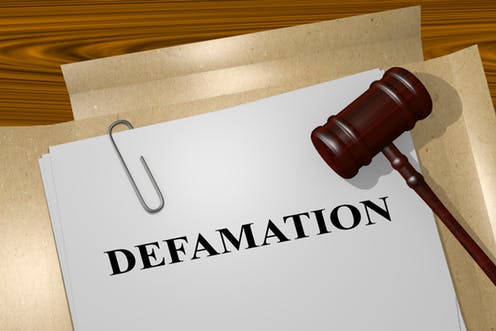Defamation is the presentation of false information, verbal or written, about a person that damages his/her reputation in the eyes of the public. It refers to gossips, trolling, rumors and innuendo. The untrue or abusive statement can be both personal and professional. Defamation can occur in the form of social media posts, email, and newspaper articles, through websites or through gestures or pictures in public.
Over the years defamation laws in Australia has been improved further to help people whose reputation has been harmed due to publication of false or misleading information. Defamation law also aims to silence criticism by an individual or group. In comparison to other countries, occurrences of defamation are constantly on the rise in Australia.
Defamation can be of two types.
- Slander: Slander refers to oral defamation, for instance comments made in public.
- Libel: Libel refers to published defamation, for instance words and pictures printed in a newspaper article
The terms Libel and Slander are no longer used and heard in Australia. This is because one cannot sue the offender for libel and slander since the legal actions do not exist anymore. At present, both libel and slander come under defamation.
Defamation can affect your general wellbeing. So if someone has spread rumors or gossips or has posted anything bad about you or your business online and if it has affected your physical and mental health, you have the right to sue that person. For that, first of all you need to seek legal advice from defamation claim Lawyer, know the law of defamation and also find out if there is a way out to undo the damage occurred. Speaking in general, you can claim compensation or demand an apology in the following conditions.
- When someone makes an untrue statement
- The statement has been made in public
- The statements malign your image in public within a group of people
If all the above things happen, you are eligible to file a defamation case. Whether you win the case or not, depends entirely on the evidence you can provide. The best evidence can be collected, the moment it happens. Though it is very difficult to act accordingly when such things happen, recording the evidence maximizes your chance of winning the case.
Things you can do following defamation
- When such comments are made, you should get a screenshot and save it. Also keep a record of the time and date when the incident occurred.
- Note down who the ones are viewing the comments. Whether the audience is a group in social media, your friends or it was a public post.
- Give a careful thought about the comment and write down how it is affecting you
- When someone informs you about the disgraceful comment, make a note of the person who told you, the time when it was informed and what was said including the exact words or gestures. For instance, we someone rings you up to tell you that they came to know about the post. Note down the things they say. If they inform you through a message, do not forget to save the same.
Once the above steps have been carried out, it is time to get a concerns notice issued. The concerns notice states what comment was made and the reasons it is being considered as defamatory. The concern letter calls for an apology, compensation and withdrawal of the comment.
Things that need to be proved in a defamation case
For a defamation case to succeed, you need to prove the following facts.
- A third party must come to know about the defamatory statement
- The comment has to be a defamatory one
- The comment must be related to the plaintiff
- The offender cannot provide any lawful information for making the defamatory statement
Who can file a defamation lawsuit?
If it is either an individual, certain non-profit corporation or corporations having 10 or less than 10 employees can file a defamation lawsuit. You must commence the legal proceedings within 12 months from the date on which the defamatory material was published against the offender.
However, the common people of Australia can hardly access defamation laws because of the extremely high cost involved in legal proceedings. It is mostly availed by politicians and entities who think that either an individual, community or media has hurt their reputation by publishing information about their actions.
Types of defamation
- Social media defamation
- Criminal defamation
- Publication defamation
- Commercial corporate defamation
- Defamation in the media
- Civil defamation
- Defamation of character
- Injurious falsehood
- Defamation on the internet
How defamation lawyers can help?
Defamation lawyers are expert professionals who assist you when you are subject to slander or libel. In a defamation case, there are certain aspects that need to be brought to the court to support the case and get a favourable outcome. If you are subjected to defamation of character, your career may get ruined. The qualified and experienced team of defamation of character solicitors aims to provide the best legal assistance to individuals whose reputation is at risk. They guide you the best possible way to make your defamation lawsuit a success. They take pride in securing their clients from reputational damage by handling all defamation of character lawsuit appropriately. The experienced defamation lawyers help you to choose the best possible options and also build a strong case for victims of defamation. They represent you in court and make sure that your reputation remains protected. When you hire defamation lawyer near me it is likely that the case will get resolved without having to go through the complicated legal procedures. Whether you are a businessman, a politician or a celebrity, defamation lawyers are ready to support you.
Perhaps you agree with the fact that it takes long to build a reputation, so don’t let someone destroy it. It is best to hire a defamation lawyer if you believe that you have been defamed and you should be compensated for that.

